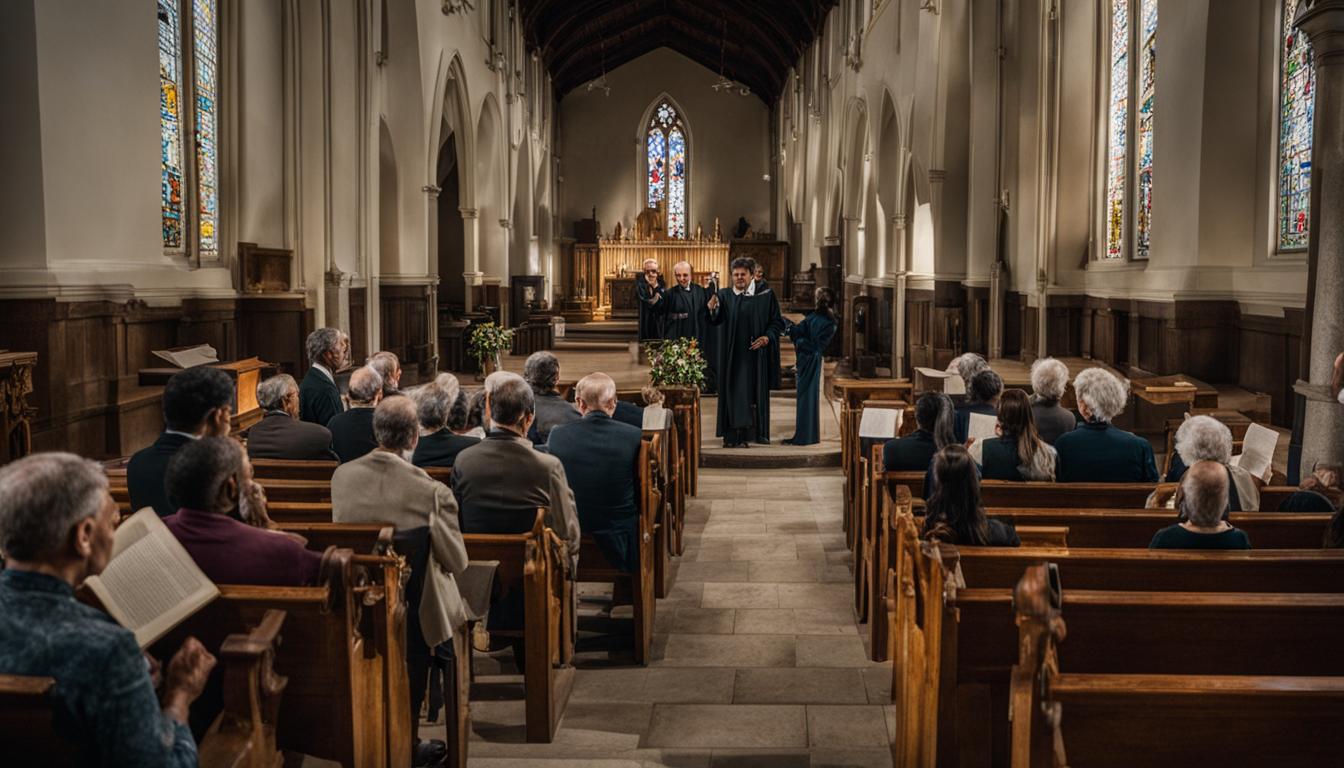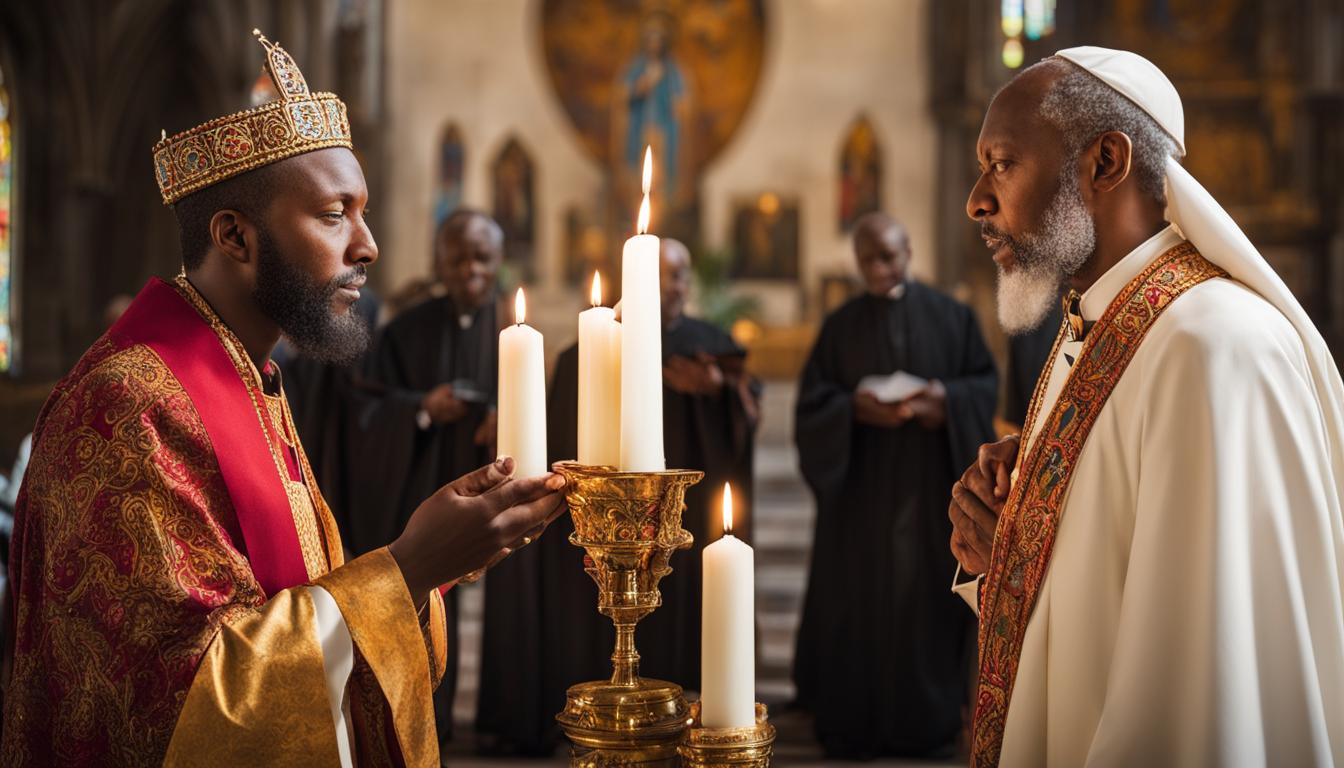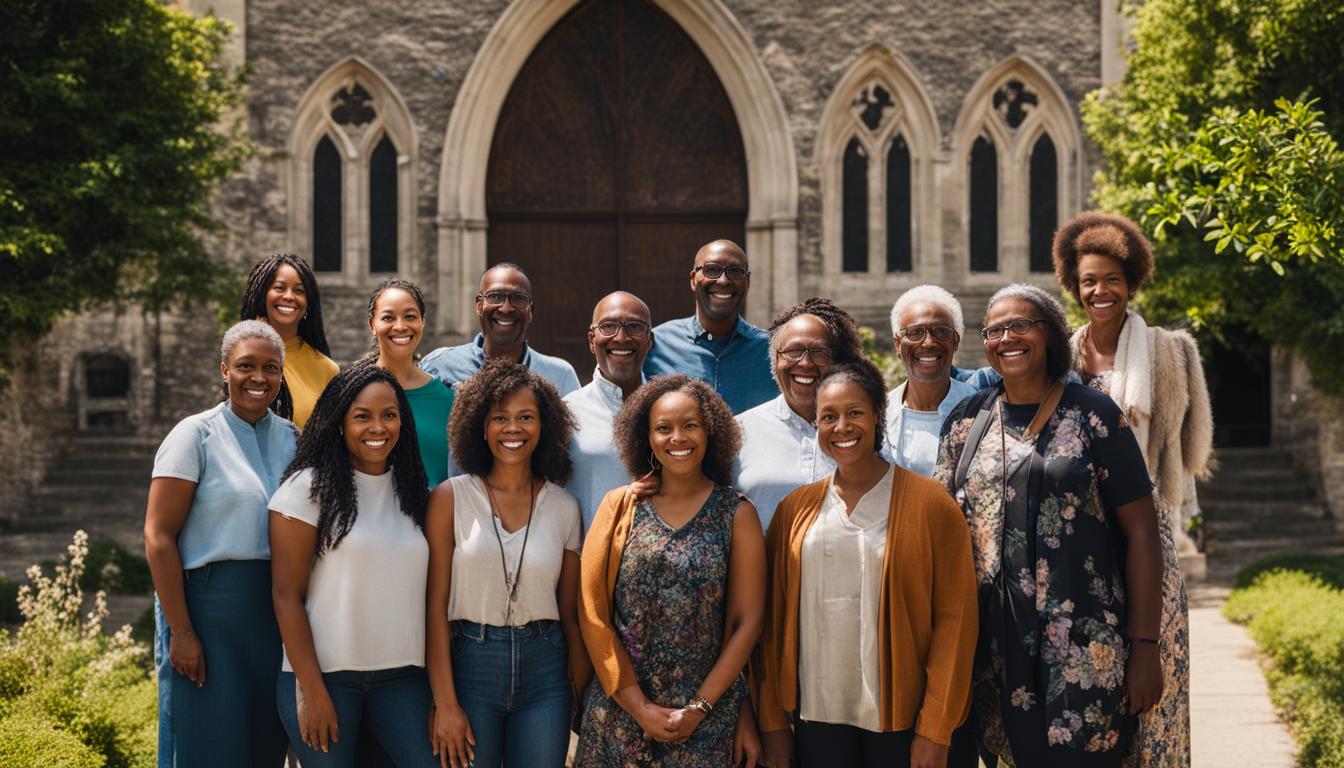Church leadership is a crucial aspect of building a thriving and healthy church community. Understanding the qualifications and characteristics of church leaders is essential for effective leadership and spiritual growth. In this comprehensive guide, we will delve into the various aspects of church leadership qualifications, including biblical teachings, skills, and traits that make for an effective church leader.
Key Takeaways:
- Church leadership is vital for the health and growth of a church.
- Biblical teachings provide guidance on church leadership qualifications.
- Effective church leaders possess specific skills and traits.
- Weak or unqualified church leaders can have negative consequences.
- The congregation plays a significant role in supporting church leadership.
Why Church Leadership is Important
Church leadership plays a vital role in the overall health and growth of a church. The significance of church leaders cannot be overstated, as they are responsible for guiding and supporting the congregation in their spiritual journey. Effective church leaders provide direction, vision, and pastoral care, creating a sense of community and fostering spiritual growth among the members.
The impact of church leadership goes beyond the internal workings of the church. It extends to the lives of individuals and the fulfillment of God’s purpose for the church in the world. Through their leadership, church leaders inspire and mobilize the congregation to actively live out their faith, serve their communities, and make a positive impact on society.
One of the benefits of effective church leadership is the creation of a healthy church environment. When leaders exemplify qualities such as integrity, humility, and servant-heartedness, they set a positive example for the congregation to follow. Strong leadership also promotes unity, cooperation, and effective decision-making, contributing to the overall success and effectiveness of the church’s mission.
The Role of Church Leaders
“The function of leadership is to produce more leaders, not more followers.” – Ralph Nader
The role of church leaders is multifaceted. They serve as spiritual guides, teachers, counselors, and shepherds of the flock. Church leaders are responsible for overseeing the spiritual well-being of the congregation, providing biblical teaching and pastoral care that address the needs and challenges faced by the members.
Church leaders also play a crucial role in shaping the vision and direction of the church. They help articulate and communicate the church’s mission, values, and goals, guiding the congregation in fulfilling its purpose. By casting a compelling vision and providing strategic leadership, church leaders inspire the congregation to actively participate in the mission and make a difference in the world.
Additionally, church leaders serve as role models and mentors for the members. They offer guidance, support, and encouragement, nurturing the development of spiritual gifts and leadership potential within the congregation. Through discipleship and equipping, church leaders empower individuals to serve and lead in various capacities, fostering a culture of shared responsibility and active engagement in ministry.
| Benefits of Effective Church Leadership |
|---|
| 1. Spiritual growth and maturity of the congregation |
| 2. Unity, cooperation, and effective decision-making |
| 3. Mobilization of the congregation for impactful ministry |
| 4. Creation of a healthy church community |
| 5. Inspiration and encouragement for active faith |
Biblical Teachings on Church Leadership
The Bible provides valuable teachings and guidelines on church leadership, offering insights into the qualifications and expectations for those who aspire to lead in a church setting. These teachings are essential for establishing a strong foundation and ensuring effective leadership within the church. Let’s explore some key biblical principles and qualifications for church leaders.
Qualifications for Church Leaders
The qualifications for church leaders are outlined in passages such as 1 Timothy 3:1-13 and Titus 1:6-9. These passages emphasize the importance of moral character, spiritual maturity, and the ability to teach and lead with integrity. Some key qualifications include being above reproach, faithful to their spouse, temperate, self-controlled, respectable, hospitable, able to teach, not indulging in excessive drinking or pursuing dishonest gain, and having a good reputation among outsiders.
Leadership in the Early Church
In the early church, leadership was characterized by a shared responsibility and a focus on servant leadership. Acts 6:1-7 portrays the appointment of deacons to address practical needs within the church, allowing the apostles to focus on prayer and the ministry of the Word. This demonstrates the value of delegating responsibilities and empowering others to serve. Additionally, Ephesians 4:11-13 highlights the importance of equipping and building up the saints for the work of ministry, fostering a collaborative and supportive leadership culture.
Biblical Guidelines for Church Leaders
Biblical teachings also emphasize the importance of qualities such as humility, wisdom, love, and faithfulness in church leaders. Jesus himself provided a powerful example of servant leadership, instructing his disciples to lead by serving others and not seeking positions of power and authority (Mark 10:42-45). Leaders are called to shepherd the flock, providing spiritual guidance, care, and protection (1 Peter 5:1-4). They are to lead with humility and love, seeking the welfare and growth of the church.

| Key Qualifications | References |
|---|---|
| Above reproach | 1 Timothy 3:2 |
| Faithful to their spouse | 1 Timothy 3:2 |
| Temperate | 1 Timothy 3:2 |
| Respectable | 1 Timothy 3:2 |
| Able to teach | 1 Timothy 3:2 |
| Not indulging in excessive drinking | 1 Timothy 3:3 |
| Not pursuing dishonest gain | 1 Timothy 3:8 |
| Having a good reputation among outsiders | 1 Timothy 3:7 |
| Not quick-tempered | Titus 1:7 |
| Self-controlled | Titus 1:8 |
Models of Church Leadership
In the realm of church leadership, various models are adopted by different churches based on their beliefs and traditions. These models determine the structure and governance of the church, shaping the roles and responsibilities of leaders and the congregation. Let us explore the three common models of church leadership: congregationalism, presbyterianism, and episcopalianism.
Congregationalism
Congregationalism is a model where individual churches possess the authority to decide their own course of action and make decisions collectively. The power lies with the entire congregation, who participates in the decision-making process. This model emphasizes the autonomy and independence of local churches, with leaders serving as facilitators and coordinators. The leadership structure typically includes pastors, deacons, and a board of directors or council elected by the congregation.
Presbyterianism
In presbyterianism, the governance of the church is entrusted to a group of elders known as the presbytery. These elders, elected by the congregation, provide spiritual guidance and oversight. The presbytery operates at different levels, including local, regional, and national, each with its own leadership hierarchy. This model emphasizes collective decision-making and accountability, with leaders working in partnership with the congregation to discern the will of God and steer the church forward.
Episcopalianism
Episcopalianism follows a hierarchical structure with governing authority held by bishops or overseers. Bishops have the ultimate authority and are responsible for the spiritual oversight of multiple churches within a designated region or diocese. The bishops appoint and oversee clergy within their jurisdiction. This model emphasizes the continuity and unity of the church under the leadership of bishops, who represent the apostolic succession.
These various models of church leadership offer different approaches to the organization and operation of the church. Each model comes with its own strengths and considerations, influencing the dynamics between leaders and the congregation. It is crucial for churches to prayerfully consider the model that aligns with their theological beliefs, values, and goals, as it directly impacts the leadership structure and decision-making process.
By understanding the different models of church leadership, we can gain insights into the diverse ways churches function and cultivate effective leadership. While each model has its distinct characteristics, the ultimate goal remains the same: to lead the church in fulfilling its mission, bringing glory to God, and nurturing the spiritual growth and well-being of the congregation.
Traits of Effective Church Leaders
Effective church leaders possess a combination of traits that enable them to lead their congregations with wisdom, grace, and impact. These leaders are not only skilled in their roles but also exemplify characteristics that inspire and guide their communities. Let’s explore some of the key qualities that contribute to the success of church leaders.
The Qualities of a Good Church Leader
- Spiritual Maturity: Good church leaders have a deep and personal relationship with God. They continually seek spiritual growth and demonstrate a genuine commitment to their faith.
- Empathy: Church leaders show empathy towards their congregation, understanding the diverse needs and struggles of individuals. They offer compassion and support, helping others navigate through challenges.
- Effective Communication: Successful church leaders possess excellent listening and communication skills. They are able to convey their messages clearly and inspire their congregation through their words.
- Pastoral Care: Church leaders are capable of providing pastoral care and support to their members. They are attentive to the emotional and spiritual needs of individuals, offering guidance and comfort.
- Self-Awareness: Effective leaders have a deep understanding of themselves, their strengths, and their weaknesses. They are humble and open to feedback, constantly working on personal growth.
- Vision: Church leaders have a clear vision for their congregation and work towards its realization. They inspire and motivate others to pursue the mission and goals of the church.
- Community Building: Successful leaders foster a strong sense of community among their members. They promote unity, encourage collaboration, and create an environment where everyone feels valued and included.
Quote: “A good church leader is someone who embodies the teachings of Christ, leading by example and guiding their congregation towards spiritual growth and service to others.” – Pastor Jane Smith
The qualities mentioned above are essential for church leaders to make a positive impact on their congregations. These traits enable leaders to inspire, guide, and nurture their members, creating a vibrant and flourishing church community. Through their spiritual maturity, empathy, effective communication, pastoral care, self-awareness, vision, and community-building efforts, church leaders play a crucial role in shaping the lives of individuals and the overall growth of the church.
Table: Key Qualities of Effective Church Leaders
| Qualities | Description |
|---|---|
| Spiritual Maturity | Deep and personal relationship with God; commitment to spiritual growth. |
| Empathy | Understanding and compassion towards the needs and struggles of others. |
| Effective Communication | Clear and inspiring communication; active listening skills. |
| Pastoral Care | Providing guidance and support; addressing emotional and spiritual needs. |
| Self-Awareness | Recognizing strengths and weaknesses; continuous personal growth. |
| Vision | Having a clear vision for the church; motivating others to pursue it. |
| Community Building | Promoting unity and collaboration; creating an inclusive environment. |
The Decline of Church Leadership and its Consequences
The challenges in church leadership are becoming increasingly evident in many churches today. One concerning trend is the decline of spiritual maturity in church leaders. This decline can have serious consequences for the overall health and effectiveness of the church.
Weak or unqualified church leaders can contribute to a variety of problems within the church community. They may lack the necessary skills, knowledge, and character to provide effective leadership and guidance. This can lead to a lack of direction, internal strife, and a diminished ability to fulfill God’s purpose for the church.
“Without strong and qualified leaders, a church may struggle to grow, experience division among its members, and lose the trust and faith of the congregation.”
The impact of unqualified church leaders can be far-reaching. They may struggle to make wise decisions, effectively address conflicts, and provide adequate pastoral care. This can result in a loss of trust and faith in the leadership, causing members to question the church’s mission and vision.
It is crucial for churches to address the decline of church leadership and take steps to ensure that qualified and spiritually mature leaders are in place. By doing so, churches can strengthen their leadership structures and create an environment conducive to growth, unity, and the fulfillment of God’s purposes.
The Consequences of Weak Church Leadership
| Consequence | Impact |
|---|---|
| Lack of growth | The church may struggle to attract new members and retain existing ones, leading to a stagnant or declining congregation. |
| Internal strife | Conflicts and divisions within the church community can arise, hindering unity and cooperation. |
| Loss of faith in the congregation | Members may lose confidence in the church’s ability to fulfill its mission, causing them to question their faith and commitment. |
| Diminished ability to fulfill God’s purposes | A lack of qualified leaders can hinder the church’s ability to effectively carry out its mission and vision. |

Impact of Unqualified Church Leaders
- Ineffective decision-making
- Poor conflict resolution
- Lack of pastoral care
- Loss of trust and faith in leadership
Recovering God’s Pattern of Biblical Leadership
Restoring church leadership to its biblical roots is crucial for the health and effectiveness of the church. By returning to biblical leadership principles, churches can align their leadership structures with God’s design and fulfill their purpose in the world. By doing so, they can ensure that their leaders possess the necessary qualifications and qualities to guide the congregation towards spiritual growth and community impact.
In order to recover God’s pattern of biblical leadership, it is important to study and understand the teachings of the Bible regarding leadership. This includes exploring passages such as 1 Timothy 3:1-13 and Titus 1:6-9, which outline the qualifications and characteristics of church leaders. These qualifications emphasize moral character, spiritual maturity, and the ability to teach and lead with integrity.
Additionally, restoring church leadership involves creating a culture of accountability within the congregation. Church members should actively support and hold leaders accountable to the biblical standards of leadership. This can be achieved through open communication, feedback, and a shared commitment to upholding God’s design for church leadership.
By recovering God’s pattern of biblical leadership, churches can ensure that their leaders are qualified, equipped, and motivated to serve the congregation effectively. This will ultimately lead to a stronger, healthier, and more impactful church community.

The Qualifications for Church Leaders
| Qualification | Description |
|---|---|
| Moral Character | Leaders should exhibit integrity, honesty, and a commitment to ethical behavior. |
| Spiritual Maturity | Leaders should have a deep understanding of the Bible, a strong prayer life, and a personal relationship with God. |
| Teaching Ability | Leaders should be able to effectively communicate and teach the scriptures to others. |
| Servant Leadership | Leaders should have a heart for serving others and putting the needs of the congregation above their own. |
| Humility | Leaders should be humble and willing to admit their mistakes, seek forgiveness, and learn from others. |
Evaluating Church Leadership Qualifications
In order to ensure effective church leadership, it is crucial for churches to carefully assess and evaluate the qualifications of potential leaders. By thoroughly evaluating leadership qualifications, churches can identify and select individuals who are well-suited to lead and serve the congregation.
Assessing church leaders involves considering various factors, including their spiritual maturity, character, experience, and ability to serve and lead effectively. This evaluation process helps churches determine if potential leaders align with the biblical standards and possess the necessary qualities to fulfill their leadership responsibilities.
Quote: “The true measure of leadership is influence – nothing more, nothing less.” – John C. Maxwell
Measuring church leadership effectiveness is essential to determine the impact and success of the leaders in fulfilling their roles. It involves evaluating their ability to guide and support the congregation, foster spiritual growth, and create a sense of community. By assessing leadership effectiveness, churches can identify areas that require improvement and provide the necessary support and development opportunities for their leaders.
| Qualifications | Evaluation Criteria |
|---|---|
| Spiritual Maturity | Examining their personal walk with God, commitment to spiritual disciplines, and understanding of biblical teachings. |
| Character | Evaluating their integrity, honesty, humility, and ability to demonstrate Christ-like virtues. |
| Experience | Assessing their previous leadership experience, including roles within the church or other relevant organizations. |
| Ability to Serve and Lead Effectively | Examining their communication skills, ability to delegate tasks, resolve conflicts, and lead with vision. |

Evaluating church leadership qualifications is a vital process in selecting qualified and effective leaders who will guide, mentor, and serve the congregation. By making informed decisions, churches can ensure their leaders have the necessary qualities to lead the church in fulfilling its mission and purpose.
Supporting Church Leadership through Collaboration and Empowerment
The role of church members in supporting leadership is crucial for the effective functioning and growth of a church community. By collaborating with and empowering church leaders, congregational members contribute to the overall success and impact of the church. This section explores the importance of supporting church leadership, the role of the congregation in leadership endeavors, and the benefits of collaboration.
When church members actively support their leaders, they create an environment of trust, unity, and shared vision. By respecting and following the leadership’s guidance and decisions, congregational members demonstrate their commitment to the church’s mission and goals. This collaboration allows leaders to focus on their responsibilities with confidence, knowing that they have the support and trust of the congregation.
Empowering church leaders is another vital aspect of supporting church leadership. By providing encouragement, feedback, and constructive criticism, congregational members help leaders grow and develop in their roles. Recognizing and affirming the strengths and talents of leaders inspires them to lead with excellence and passion. Additionally, delegating appropriate responsibilities to leaders allows them to utilize their skills and talents effectively, fostering a sense of ownership and investment in the church’s progress.
Collaboration and Empowerment: Key Benefits
- Enhanced unity and cohesion within the church community
- Increased trust and confidence in church leadership
- Shared responsibility and shared vision for the church’s mission
- Stronger sense of ownership and commitment among church members
- Opportunities for leaders to grow and develop their skills
- Improved decision-making processes through diverse perspectives
By actively supporting and collaborating with church leaders, congregational members contribute to the overall health and effectiveness of the church. This collaborative relationship creates an environment that fosters trust, unity, and a shared sense of purpose. As church members empower leaders through encouragement and feedback, leaders are inspired to lead with excellence and passion. This collaboration and empowerment lay the foundation for a thriving church community that fulfills its mission and impacts lives.
| Benefits of Supporting Church Leadership | How Congregations Can Support Leadership |
|---|---|
| Enhanced unity and cohesion within the church community | Respect and follow the leadership’s guidance and decisions |
| Increased trust and confidence in church leadership | Provide encouragement, feedback, and constructive criticism |
| Shared responsibility and shared vision for the church’s mission | Collaborate with leaders in planning and decision-making |
| Stronger sense of ownership and commitment among church members | Delegate appropriate responsibilities to leaders |
| Opportunities for leaders to grow and develop their skills | Recognize and affirm the strengths and talents of leaders |
| Improved decision-making processes through diverse perspectives | Provide diverse perspectives and input during discussions |
By implementing these strategies, congregations can create a supportive and empowering environment for church leaders. This collaboration allows leaders to focus on their responsibilities, knowing they have the trust and support of the congregation. Together, leaders and congregational members can work towards a shared vision, fostering unity, growth, and impact within the church community.

Training and Equipping Future Church Leaders
Developing strong and capable leaders is essential for the future of the church. By investing in training and equipping individuals, churches can ensure a smooth succession and continuity of effective leadership. Leadership training programs and mentorship opportunities play a crucial role in preparing future church leaders.
Leadership training programs provide structured curriculum and resources to help individuals develop the necessary skills and knowledge for effective church leadership. These programs cover various aspects of leadership, including biblical teachings, practical ministry skills, and personal development. Through interactive workshops, seminars, and mentoring relationships, aspiring leaders can learn from experienced pastors and leaders, gaining valuable insights and guidance.
Mentorship is another key component of developing future church leaders. Establishing mentorship relationships allows emerging leaders to receive personalized guidance, support, and accountability from experienced leaders who have walked a similar path. Mentors can provide practical advice, spiritual encouragement, and help nurture the character and calling of the mentee.
By combining leadership training programs and mentorship opportunities, churches can create a comprehensive and holistic approach to developing future leaders. These initiatives should be tailored to meet the unique needs and aspirations of individuals, providing a balance between instruction and hands-on experience. It is important to create a culture of learning and growth within the church, where aspiring leaders are encouraged to take on new challenges and opportunities to apply their skills.
Furthermore, churches can identify and nurture leadership potential within their congregation by providing opportunities for individuals to serve in various ministries and leadership roles. This practical experience allows them to develop their leadership abilities and discern their calling under the guidance and mentorship of more seasoned leaders.
In conclusion, equipping and training future church leaders is a vital task that ensures the ongoing health and growth of the church. Leadership training programs and mentorship opportunities provide aspiring leaders with the necessary knowledge, skills, and support to lead effectively. By investing in the development of future leaders and creating a culture of learning, churches can fulfill their mission and impact their community for years to come.
Conclusion
In conclusion, church leadership qualifications are vital for the overall health and success of a church. By adhering to biblical teachings and selecting leaders who possess the necessary qualities, churches can create a strong foundation for growth and impact. Effective church leaders demonstrate spiritual maturity, empathy, and excellent communication skills, among other traits.
Building a supportive relationship between leaders and the congregation is essential. Church members play a crucial role in empowering and supporting their leaders through respect, collaboration, and providing constructive feedback. By working together, leaders and the congregation can create a culture of trust and unity, leading to a thriving church community.
To ensure a bright future for the church, it is important to invest in the training and development of future leaders. Leadership programs, mentorship, and opportunities for growth help equip individuals to take on leadership roles with confidence and effectiveness. By nurturing and preparing the next generation of church leaders, churches can ensure a smooth succession of leadership and continued impact.
In summary, the qualifications and characteristics of church leaders are foundational for the growth and health of a church. By following biblical teachings, selecting qualified leaders, fostering a supportive relationship between leaders and the congregation, and investing in the development of future leaders, churches can fulfill God’s purposes and make a lasting impact in their communities and beyond.
FAQ
What are the qualifications for church leaders according to the Bible?
The qualifications for church leaders are outlined in passages such as 1 Timothy 3:1-13 and Titus 1:6-9. These qualifications emphasize moral character, spiritual maturity, and the ability to teach and lead with integrity.
Why is church leadership important?
Church leadership is important because it provides guidance, support, and direction to the congregation. Effective church leaders play a significant role in shaping the church’s vision, fostering spiritual growth, and creating a sense of community.
What are the different models of church leadership?
Some common models of church leadership include congregationalism, presbyterianism, and episcopalianism. Each model has its own leadership expectations and roles for both leaders and the congregation.
What are the qualities of effective church leaders?
Effective church leaders possess qualities such as spiritual maturity, empathy, excellent listening skills, the ability to provide pastoral care, persuasive communication, and the ability to build a strong sense of community.
What are the consequences of weak church leadership?
Weak church leadership can lead to a lack of growth, internal strife, loss of faith in the congregation, and a diminished ability to fulfill God’s purposes.
How can churches recover God’s pattern of biblical leadership?
To recover God’s pattern of biblical leadership, churches can prioritize spiritual maturity and the qualities outlined in the Bible for church leaders. The congregation also plays a role in supporting and holding leaders accountable.
How can church leadership qualifications be evaluated?
Church leadership qualifications can be evaluated by assessing spiritual maturity, character, experience, and the ability to serve and lead effectively.
What is the role of church members in supporting leadership?
Church members can support leadership by respecting and following the leadership, providing encouragement and feedback, and collaborating with leaders to empower and strengthen the leadership team.
How can future church leaders be trained and equipped?
Future church leaders can be trained and equipped through leadership development programs, mentorship, and providing opportunities for growth and hands-on experience.

















I don’t think the title of your article matches the content lol. Just kidding, mainly because I had some doubts after reading the article.
Your article helped me a lot, is there any more related content? Thanks!
Thank you for your sharing. I am worried that I lack creative ideas. It is your article that makes me full of hope. Thank you. But, I have a question, can you help me?
mexico pharmacies prescription drugs
http://cmqpharma.com/# reputable mexican pharmacies online
mexican border pharmacies shipping to usa
buying prescription drugs in mexico: mexican pharmacy – mexican rx online
india pharmacy mail order: buy medicines online in india – reputable indian pharmacies
Online medicine order: indian pharmacies safe – indianpharmacy com
https://foruspharma.com/# mexican mail order pharmacies
best india pharmacy [url=https://indiapharmast.com/#]online shopping pharmacy india[/url] buy prescription drugs from india
canadian world pharmacy: canadian online drugs – canadian pharmacies compare
india pharmacy mail order [url=http://indiapharmast.com/#]п»їlegitimate online pharmacies india[/url] india online pharmacy
https://foruspharma.com/# mexican drugstore online
п»їlegitimate online pharmacies india: indian pharmacy online – indianpharmacy com
buy medicines online in india: cheapest online pharmacy india – best online pharmacy india
http://canadapharmast.com/# reputable canadian online pharmacies
http://doxycyclinedelivery.pro/# where to buy doxycycline 100mg
where buy clomid price [url=https://clomiddelivery.pro/#]can i purchase clomid without prescription[/url] where can i get generic clomid
buy clomid: where buy clomid without dr prescription – buying clomid
http://clomiddelivery.pro/# how to buy clomid without a prescription
п»їpaxlovid [url=https://paxloviddelivery.pro/#]paxlovid for sale[/url] paxlovid buy
http://ciprodelivery.pro/# ciprofloxacin mail online
how to get doxycycline online [url=http://doxycyclinedelivery.pro/#]doxycycline hydrochloride 100mg[/url] doxycycline 40 mg india
purchase cipro: ciprofloxacin order online – ciprofloxacin 500 mg tablet price
https://clomiddelivery.pro/# can you get cheap clomid without rx
antibiotics cipro [url=http://ciprodelivery.pro/#]where can i buy cipro online[/url] buy generic ciprofloxacin
amoxicillin for sale: amoxicillin 500 mg cost – amoxicillin 500mg capsule
http://ciprodelivery.pro/# ciprofloxacin over the counter
clomid pills [url=http://clomiddelivery.pro/#]can you buy clomid prices[/url] buy clomid without rx
paxlovid india: paxlovid cost without insurance – paxlovid cost without insurance
http://clomiddelivery.pro/# can i get clomid no prescription
paxlovid pill [url=https://paxloviddelivery.pro/#]paxlovid buy[/url] paxlovid pharmacy
http://clomiddelivery.pro/# can i buy generic clomid without rx
http://amoxildelivery.pro/# where can i buy amoxocillin
doxycycline price compare [url=https://doxycyclinedelivery.pro/#]doxycline[/url] doxycycline 200 mg
where can i get generic clomid pills: cost of clomid without a prescription – where buy cheap clomid now
http://paxloviddelivery.pro/# paxlovid for sale
buy amoxil [url=http://amoxildelivery.pro/#]amoxicillin pharmacy price[/url] price of amoxicillin without insurance
doxycycline 150 mg cost comparison: buy cheap doxycycline – doxycycline antibiotics
doxycycline 100mg best price: doxycycline 50mg tablets price – doxycycline 100mg capsules price in india